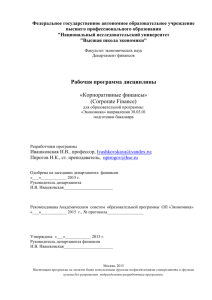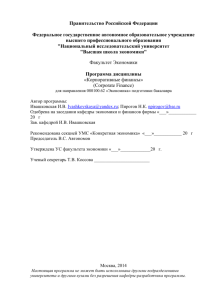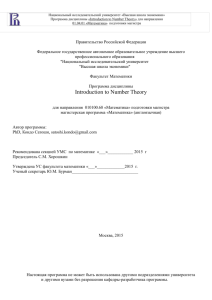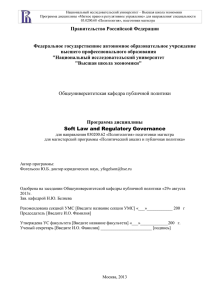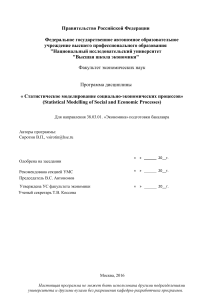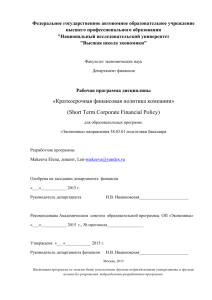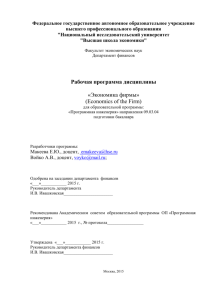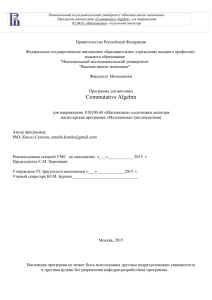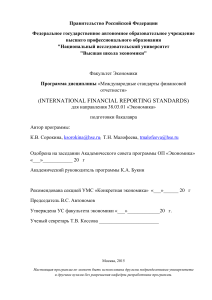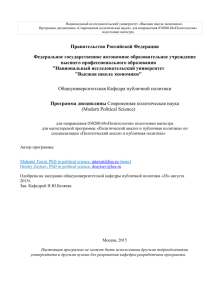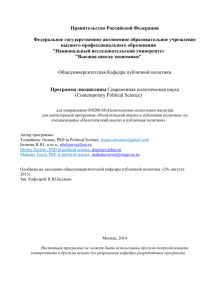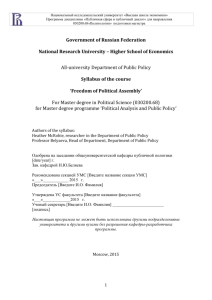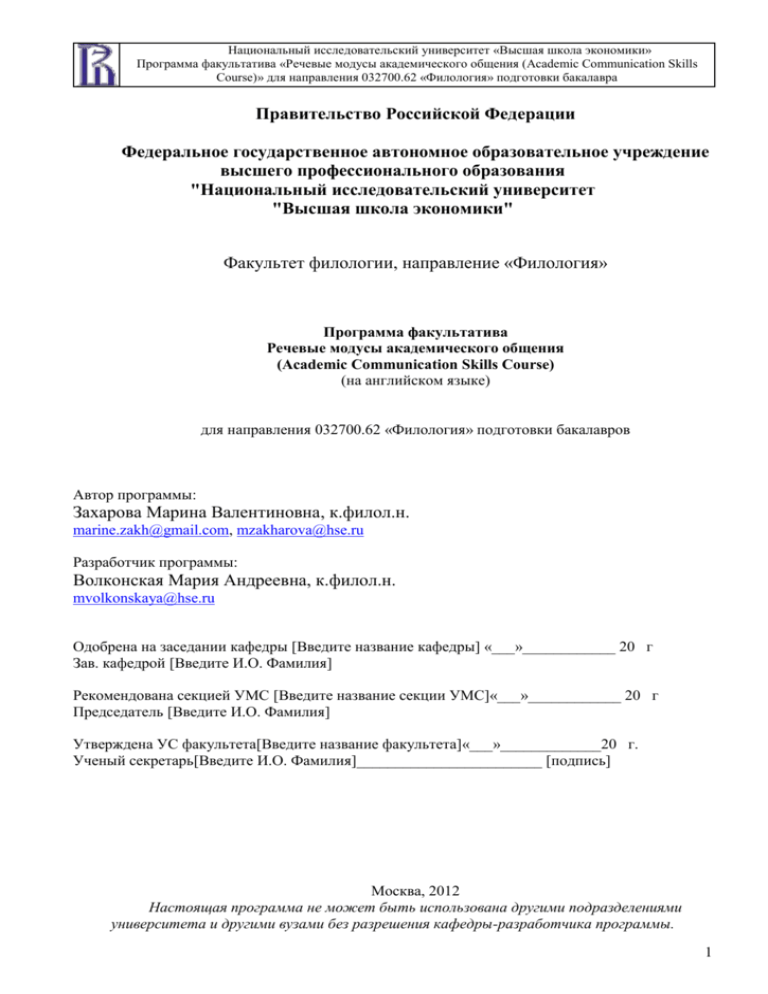
Национальный исследовательский университет «Высшая школа экономики»
Программа факультатива «Речевые модусы академического общения (Academic Communication Skills
Course)» для направления 032700.62 «Филология» подготовки бакалавра
Правительство Российской Федерации
Федеральное государственное автономное образовательное учреждение
высшего профессионального образования
"Национальный исследовательский университет
"Высшая школа экономики"
Факультет филологии, направление «Филология»
Программа факультатива
Речевые модусы академического общения
(Academic Communication Skills Course)
(на английском языке)
для направления 032700.62 «Филология» подготовки бакалавров
Автор программы:
Захарова Марина Валентиновна, к.филол.н.
marine.zakh@gmail.com, mzakharova@hse.ru
Разработчик программы:
Волконская Мария Андреевна, к.филол.н.
mvolkonskaya@hse.ru
Одобрена на заседании кафедры [Введите название кафедры] «___»____________ 20 г
Зав. кафедрой [Введите И.О. Фамилия]
Рекомендована секцией УМС [Введите название секции УМС]«___»____________ 20 г
Председатель [Введите И.О. Фамилия]
Утверждена УС факультета[Введите название факультета]«___»_____________20 г.
Ученый секретарь[Введите И.О. Фамилия]________________________ [подпись]
Москва, 2012
Настоящая программа не может быть использована другими подразделениями
университета и другими вузами без разрешения кафедры-разработчика программы.
1
Национальный исследовательский университет «Высшая школа экономики»
Программа факультатива «Речевые модусы академического общения (Academic Communication Skills
Course)» для направления 032700.62 «Филология» подготовки бакалавра
I. Организационно-методический раздел (Course description)
The course targets bachelor students in Philology and is aimed at assisting students to comprehend, question, evaluate and produce a range of discourses which are relevant to academic contexts.
The course helps students overcome some of the linguistic difficulties involved in studying English
and in English, and focuses on activating and extending their linguistic competence, developing critical thinking, academic speaking, listening, reading and writing skills that are crucial for functioning in
English tertiary education.
The course is more skill- than information-oriented, and it is one of the classes where students
perform as active learners instead of passive receivers and digesters of information, and embraces a
considerable number of innovations concerning content, structure, presentation, methodologies, and
student activities.
1. Цели курса (Course goals)
The course aims are:
to consolidate and develop participants' speaking skills as required in an academic English-speaking environment; for example, in tutorials, class discussions and seminars;
to sharpen students’ strategic competence in face-to-face interaction;
to review and give practice in a variety of appropriate techniques and phrases that will
help participants take part in discussions more confidently and effectively;
to provide practice in exchanging personal ideas on an interesting variety of discussion
topics agreed by the tutor and class participants;
to provide practice in listening to lectures and note-taking skills;
to develop reading and writing skills.
In order to achieve these goals, the course involves step-by-step instruction in every stage of
developing academic discourses in English. In particular, the following techniques and practices are
taught:
1)
2)
Speaking section assists to:
develop participation skills such as learning how to participate actively in seminars and
group discussions, control the discussion, change the subject, prevent interruptions, support
one’s view agreeing and disagreeing (i.e. discussion skills);
learn how make a presentation, adapt preparation and presentation techniques to various
oral tasks required at university (i.e. presentation skills).
Writing section deals with:
essay construction and the types of essays required in the academic environment. Students are taught to differentiate an explanation from an exposition, and description from
argument, etc.;
methods how to avoid plagiarism and how to reference essays properly;
using sources: making notes and writing up notes - paraphrasing, summarising, quoting
& referring to sources, writing a bibliography.
3)
Grammar and Vocabulary section is taught as being a part of whole texts, that is, it is
within readings, discussions and lectures rather than separate from them.
2
Национальный исследовательский университет «Высшая школа экономики»
Программа факультатива «Речевые модусы академического общения (Academic Communication Skills
Course)» для направления 032700.62 «Филология» подготовки бакалавра
4)
Listening section is meant to:
present many varieties of spoken English;
teach the principles, the vocabulary, the format of lectures, and give authentic practice
in listening to a lecture and taking notes;
deduce the meaning of unfamiliar words and word groups.
recognise implications: information not explicitly stated, recognise the speaker's attitude, evaluate the importance of information - select information;
use skimming (listening to obtain gist) and scanning (listening to obtain specific information), selective extraction of relevant points to summarise text.
5)
Reading section is designed to:
familiarize students with different types of academic texts, different text structures, the
communicative value of sentences relations between the parts of a text through lexical and
grammatical cohesion devices and indicators in discourse;
teach how to understand important points distinguishing the main ideas from supporting
detail, recognise unsupported claims and claims supported by evidence, read critically and
evaluate the text;
introduce ways of thinking and of approaching texts: understanding texts deducing the
meaning of unfamiliar words and word groups relations within the sentence/complex sentences implications, conceptual meaning, e.g. comparison, purpose, cause, effect;
read efficiently surveying the text, chapter/article, paragraphs, skimming for gist/general
impression, scanning to locate specifically required information reading quickly;
develop the note taking skill.
2. Задачи курса (Course objectives):
The course aims to enable students to:
1)
adjust their language to spoken and written discourse;
2)
identify and correctly target the potential audience by choosing appropriate style, vocabulary, and level of formality;
3)
take part in discussions and debates on various topics;
4)
identify and implement the basic speaking strategies and standards of English academic
monologue speaking, including argumentation structure, data presentation, appropriate transitions and
signposts, compositional, rhetoric, stylistic, verbal, and grammatical devices;
5)
identify and implement the basic speaking strategies and standards of English academic
dialogue speaking, including expressing and supporting opinions, asking and answering questions,
agreeing and disagreeing, giving and taking the floor, turn-taking, interrupting and preventing interruptions giving a response, following up on other speakers’ points; hesitating and expressing degrees of
certainty; responding to difficult questions, reacting to an idea, reflecting on an idea;
6)
be an active listener, and use the non-verbal language;
7)
implement the basic listening strategies, including listening between the lines, for specific information, for the main idea, taking notes;
8)
read for the main idea, for specific information, make inferences & interpretations, read
for details, read between the lines, skim, scan, identify different opinions, evaluate different viewpoints, make connections between ideas, read extensively to gather data, sort through & prioritize information, expand vocabulary & activate passive vocabulary; understand, interpret and discuss academic texts in English.
3
Национальный исследовательский университет «Высшая школа экономики»
Программа факультатива «Речевые модусы академического общения (Academic Communication Skills
Course)» для направления 032700.62 «Филология» подготовки бакалавра
3. Методическая новизна курса: новые методики, формы работы, авторские приемы в
преподавании курса (Course novelty: new methodologies, activities, the author’s original methods
in course instruction).
This course is a type of English for specific purposes course with the teaching content explicitly matched to the language, practices and study needs of the learners.
First, the course is goal directed - the learners are not learning the English language for the sake
of it, but because they need, or will need, to use English in their professional or academic lives.
Second, the course is based on an analysis of needs, which aims to specify as closely as possible exactly what it is that the learners have to do through the medium of English. This means taking
into account the opinions of all the various stakeholders, and therefore, involves an attitude to learning
and teaching that believes that it is possible and useful to specify what language and practices are required in a particular academic context and that it is worthwhile to focus teaching on this. For that reason, one important feature is the close attention that is paid to the learners’ aims and what they are
working on, studying or planning to study.
Third, there is a clearly specified period for the course. Students are undertaking a fixed term
course in preparation for a particular task – such as an essay, team project, in-class presentation –
studying English for a short time every week along with their academic courses or jobs.
For this reason Academic communication teaching is task based, using the types of academic
task found in Department of Philology classes and being based on some kind of authentic tasks that the
students do in their own time, with the help of in-class teaching, guided practice and individual tutorial
support.
Teaching is strongly focussed on what is needed for different tasks. A typical approach to
teaching listening for academic purposes would involve doing large amounts of in-class listening, prerecorded, helping the students to be more aware of typical language used in lectures, giving them guided practice as well as strategies for dealing with difficulties.
Reading is similar with students doing large amounts of in-class and out of class reading of authentic texts, as well as the lecturer helping the students to be more aware of typical language used in
academic texts, text structure and strategies for reading critically and dealing with difficulties.
A typical approach to teaching spoken English for academic purposes would be tasked based
with students doing short guided exercises leading to taking part in realistic seminar discussions and
giving oral presentations, both supported by class teaching and individual tutorials.
The course relies on lecture and seminar forms and employs a variety of innovative teaching
methods that allow to make the process of knowledge and skill acquisition less passive and, therefore,
more efficient. Classes consist of individual activities, group activities and pair work to give each participant the opportunity to benefit from speaking time in a controlled environment. The tutor monitors
individual performance in terms of vocabulary, accuracy and pronunciation, and provides regular
feedback.
4
Национальный исследовательский университет «Высшая школа экономики»
Программа факультатива «Речевые модусы академического общения (Academic Communication Skills
Course)» для направления 032700.62 «Филология» подготовки бакалавра
4. Место курса в системе подготовки бакалавров-филологов (course placement in B.A. program in Philology, course prerequisites)
The course learning outcomes are crucial for the students’ further education, as well as for their
future professional careers. This course is unique in focusing on teaching students how to express their
own thoughts in their professional field in a clear and coherent manner, adhering to all the standards of
the English-speaking academic community. It forms part of the students’ overall professional and linguistic training and prepares them for careers with the use of the English language in the following
fields:
1) Research: participation in philological seminars and conferences, writing research papers
and reports; presenting projects;
2) Practical field: formal and informal academic communication;
3) Pedagogy: teaching diverse English courses, tutoring in English.
Course prerequisites:
English language
II. Результаты обучения (Learning outcomes)
On successful completion of this course the students are expected to communicate effectively
in academic environment.
The students master the following general and professional competences:
Компетенция/Competence
Speaking
Grammar and Vocabulary
Код по
ФГОС НИУ/
Code
ОНК-3
ОНК-4
ИК-1
ИК-2
ИК-3
ИК-4
СЛК-1
СЛК-2
СЛК-3
ПК-1
ПК-3
ПК-4
ПК-6
ПК-9
ПК-14
ОНК-3
ОНК-4
ИК-1
Дескрипторы – основные признаки
освоения (показатели достижения
результата)/ Descriptors
Communicating in academic situations,
recognizing different perspectives, agreeing and disagreeing, exchanging opinions,
clarifying and confirming, taking turns in
a discussion, supporting a view point, participating in a debate, express doubt / belief, delivering a presentation, reporting
back to a discussion, using signpost expressions, presenting data, anticipating
argument before a discussion, chairing a
discussion, building on what others have
said, summarizing the outcome of a discussion, presenting information from the
text, using a text to support your ideas,
making and using notes to speak from,
describing similarities and differences,
comparing and contrasting, illustrating a
point, giving examples and referring to
research, summarising and concluding.
Mastering formal grammar constructions,
article and tense usage in academic texts;
sentence structure; punctuation (commas,
5
Национальный исследовательский университет «Высшая школа экономики»
Программа факультатива «Речевые модусы академического общения (Academic Communication Skills
Course)» для направления 032700.62 «Филология» подготовки бакалавра
Компетенция/Competence
Listening
Reading
Writing
Код по
ФГОС НИУ/
Code
ИК-2
ИК-3
ИК-4
СЛК-1
СЛК-2
СЛК-3
ПК-1
ПК-3
ПК-4
ПК-5
ПК-6
ПК-9
ПК-10
ПК-11
ПК-12
ПК-14
ОНК-3
ОНК-4
ИК-1
ИК-2
СЛК-1
СЛК-2
СЛК-3
ПК-1
ПК-3
ПК-4
ПК-14
ОНК-3
ОНК-4
ИК-1
ИК-2
СЛК-1
СЛК-2
СЛК-3
ПК-1
ПК-3
ПК-4
ПК-14
ОНК-3
ОНК-4
ИК-1
ИК-2
ИК-3
Дескрипторы – основные признаки
освоения (показатели достижения
результата)/ Descriptors
semicolons, colons, quotation marks) for
writing academic texts in English
Mastering formal vocabulary, connecting
words and transition signals; coordinating
words, subordinating words, conjunctive
adverbs; openings, closings, purpose
statements; time, place, distance, frequency, manner, reason, result, purpose, contrast, condition adverb clauses; Latin and
English academic phrases; linguistic
terms; citation vocabulary for writing academic texts in English
Mastering listening to academic texts,
note-taking, identifying key ideas in lectures, introducing new terminology,
recognition of digressions, varied lecture
styles, topics and international accents,
word and sentence stress, recognizing
word patterns
Deducing the meaning of unfamiliar
words and word groups, relations within
the sentence/complex sentences implications, conceptual meaning, e.g. comparison, purpose, cause, effect; understanding
text structure, understanding important
points distinguishing the main ideas from
supporting detail, recognising unsupported claims and claims supported by evidence, extracting salient points to summarise following an argument reading critically/evaluating the text; surveying the
text, chapter/article, paragraphs, skimming for gist/general impression, scanning to locate specifically required information, note taking.
Learning to create and edit linguistic abstracts, article critiques, research papers;
using linguistic corpora and dictionaries,
mastering structural, compositional,
grammatical and lexical characteristics
6
Национальный исследовательский университет «Высшая школа экономики»
Программа факультатива «Речевые модусы академического общения (Academic Communication Skills
Course)» для направления 032700.62 «Филология» подготовки бакалавра
Компетенция/Competence
Код по
ФГОС НИУ/
Code
ИК-4
СЛК-1
СЛК-2
СЛК-3
ПК-1
ПК-3
ПК-4
ПК-5
ПК-6
ПК-9
ПК-10
ПК-11
ПК-12
ПК-14
Дескрипторы – основные признаки
освоения (показатели достижения
результата)/ Descriptors
of different genres of English-language
academic texts
III. Содержание курса (Course outline)
1. Новизна (Novelty)
The course is a new contribution to the HSE curriculum, as there are no comparable courses either in the Linguistics department of the Philological Faculty, or in other faculties and departments.
However, its novelty lies not only in its previous absence from the HSE curriculum, but also in its innovativeness as compared to British and American courses on Academic Communication as well as in
its unique tailoring to the needs of B.A. students in Philology.
2. План курса (Course syllabus)
Распределение часов курса по темам и видам работ (Classes outline and layout)
1st year:
№
п/п
Аудиторная
Аудиторная
Самостоятель
Всего часов/
работа
Наименование тем и разделов/
работа (лекции)/
ная работа /
Total number
(семинары)/
Topics
In-class work
Out-of-class
of hours
In-class work
(lectures)
work
(seminars)
1
General issues in communication in academic situations
10
2
2
6
2
Academic grammar and vocabulary
20
6
2
12
3
Participation in seminars and
discussions
12
4
2
6
4
Listening to lectures
12
4
2
6
5
Note-taking
9
2
1
6
6
Paraphrasing
9
2
1
6
7
Национальный исследовательский университет «Высшая школа экономики»
Программа факультатива «Речевые модусы академического общения (Academic Communication Skills
Course)» для направления 032700.62 «Филология» подготовки бакалавра
7
Academic reading
12
4
2
6
8
Intro to academic writing
14
4
2
8
9
Peer review of lectures, presentations, essays
10
2
2
6
16
62
30
ИТОГО
(Total): 108
2nd year:
№
п/п
Аудиторная
Аудиторная
Самостоятель
Всего часов/
работа
Наименование тем и разделов/
работа (лекции)/
ная работа /
Total number
(семинары)/
Topics
In-class work
Out-of-class
of hours
In-class work
(lectures)
work
(seminars)
1
Academic style
16
4
4
8
2
Unity and coherence
10
2
2
6
3
Avoiding plagiarism
10
2
2
6
4
Using figures and tables
10
2
2
6
5
Referring to other people’s work
10
2
2
6
6
Researching texts
14
2
4
8
7
Summarising
10
2
2
6
8
Preparing presentations
18
4
4
10
9
Cross-cultural diversity
10
2
2
6
24
62
22
ИТОГО
(Total): 108
IV. Формы контроля (Forms of assessment and final grade determination)
Assessment
Forms of assessment
Ongoing assessment
Midterm
assessment
Class participation
Homework
Team project
Presentation
Final assessment
Essay
Quiz
1st and 2nd years
2
3
4
*
*
Parameters
*
*
*
*
*
Problem-solving group discussion
Individual presentation (7
minutes) and peer review
Book review (250 words)
In-class paper
Final grade (ten-point system)
8
Национальный исследовательский университет «Высшая школа экономики»
Программа факультатива «Речевые модусы академического общения (Academic Communication Skills
Course)» для направления 032700.62 «Филология» подготовки бакалавра
Final grade is formed from the following components: self-study, ongoing assessment, midterm
assessment, final assessment.
The final grade is calculated according to the following formula:
Gradefinal = 0,3·Gradeclass participation + 0,2·Gradeteam project + 0,1·Gradepresentation +
0,1·Gradeessay + 0,2·Gradequiz + 0,1·Gradeself-study
V. Учебные материалы (Teaching and learning materials: textbooks, designed materials, Internet
resources, Recommendations)
Textbooks:
Required materials:
1)
EAP Now! English for Academic Purposes. Students' Book+Audio CDs. Kathy Cox, David
Hill. Pearson Longman. 2004.
2) Longman Advanced American Dictionary.
Additional materials:
1. Study Speaking. K. Anderson, J. Maclean, T. Lynch. 2nd Edition. Cambridge University Press.
2004.
2. Cambridge University Press Series:
1)
2)
3)
4)
5)
Study Reading
Study Listening
Study Writing
Study Skills
Study Tasks
3. Speaking: Course Book (English for Academic Study). Joan McCormack, Sebastian Watkins. Garnet Publishing, Limited, 2009.
4. Listening: Course Book (English for Academic Study). Colin Campbell, Jonathan Smith. Garnet
Education, 2009.
5. Reading: Course Book (English for Academic Study). John Slaght. Garnet Education, 2012.
6. English for Academic Study: Extended Writing & Research Skills. Joan McCormack, John Slaght.
Garnet Education, 2012.
7. Garnet Education: English for Academic Study Series:
Writing
Pronunciation
Vocabulary
8. Michigan Series in English for Academic & Professional Purposes:
Abstracts and the Writing of Abstracts
Telling a Research Story: Writing a Literature Review.
Creating Contexts: Writing Introductions across Genres
Navigating Academia: Writing Support Genres
Academic Interactions: Communicating on Campus
9
Национальный исследовательский университет «Высшая школа экономики»
Программа факультатива «Речевые модусы академического общения (Academic Communication Skills
Course)» для направления 032700.62 «Филология» подготовки бакалавра
Academic Listening Strategies: A Guide to Understanding Lectures
Building Academic Vocabulary
Giving Academic Presentations
Discussion & Interaction in the Academic Community
Reading Skills for Success: A Guide to Academic Texts
9. Focus on Vocabulary. Mastering the Academic Word List. Diane Schmitt, Norbert Schmitt. Longman, 2005.
10. Successful Academic Writing. Andy Gillet, Angela Hammond, Mary Martala-Lockett. Pearson
Longman, 2009.
Useful Internet resources:
English for academic purposes, learning & teaching materials:
http://elc.polyu.edu.hk/cill/eap/ - materials relevant to EAP
http://eolf.univ-fcomte.fr/index.php?page=academic-reading-and-writing-exercises - academic reading
and writing exercises
http://www.uefap.com/index.htm - UEfAP - using English for academic purposes
http://services.unimelb.edu.au/academicskills/language/grammar - academic grammar
http://www.nottingham.ac.uk/alzsh3/acvocab/ - academic vocabulary
http://www.uclouvain.be/en-372126.html - Academic Keyword List
http://www.victoria.ac.nz/lals/resources/academicwordlist/ - Academic Word List
http://www.lextutor.ca/ - Complete Lexical Tutor - a wide range of vocabulary resources
http://www4.caes.hku.hk/acadgrammar/ - academic grammar
http://www.phrasebank.manchester.ac.uk/ - Academic Phrasebank - usefaul phrases for academic writing.
Online dictionaries and corpora:
http://dictionary.reference.com/
http://www.merriam-webster.com/
http://www.ldoceonline.com/
Instructional materials to be designed:
Guidelines for conducting discussions, debates, and group work.
Guidelines for making presentations.
Bank of academic vocabulary and grammar exercises.
Bank of academic listening in Philology.
Bank of academic texts in Philology.
10

